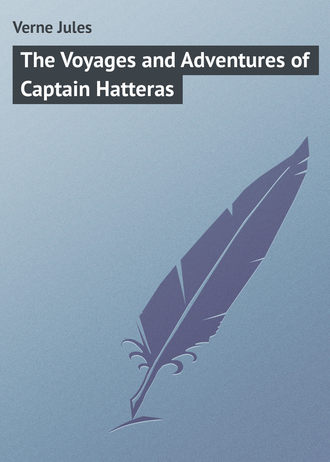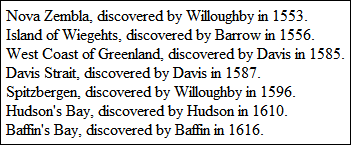 полная версия
полная версияThe Voyages and Adventures of Captain Hatteras
When twenty years old, he had the vigorous constitution of thin, sanguine men; an energetic face, with well-marked lines, a high forehead, rising straight from the eyes, which were handsome but cold, thin lips, indicating a mouth chary of words, medium height, well-knit muscular limbs, indicated a man ready for any experience. Any one who saw him would have called him bold, and any one who heard him would have called him coldly passionate; he was a man who would never retreat, and who would risk the lives of others as coldly as his own. One would hence think twice before following him in his expeditions.
John Hatteras had a great deal of English pride, and it was he who once made this haughty reply to a Frenchman.
The Frenchman said with what he considered politeness, and even kindness, —
"If I were not a Frenchman, I should like to be an Englishman."
"If I were not an Englishman, I should like to be an Englishman!"
That retort points the nature of the man.
He would have liked to reserve for his fellow-countrymen the monopoly of geographical discovery; but much to his chagrin, during previous centuries, they had done but little in the way of discovery.
America was discovered by the Genoese, Christopher Columbus; the East Indies by the Portuguese, Vasco de Gama; China by the Portuguese, Fernao d'Andrada; Terra del Fuego by the Portuguese, Magellan; Canada by the Frenchman, Jacques Cartier; the islands of Sumatra, Java, etc., Labrador, Brazil, the Cape of Good Hope, the Azores, Madeira, Newfoundland, Guinea, Congo, Mexico, White Cape, Greenland, Iceland, the South Pacific Ocean, California, Japan, Cambodia, Peru, Kamschatka, the Philippine Islands, Spitzbergen, Cape Horn, Behring Strait, New Zealand, Van Diemen's Land, New Britain, New Holland, the Louisiana, Island of Jan-Mayen, by Icelanders, Scandinavians, Frenchmen, Russians, Portuguese, Danes, Spaniards, Genoese, and Dutchmen; but no Englishmen figured among them, and it was a constant source of grief to Hatteras to see his fellow-countrymen excluded from the glorious band of sailors who made the great discoveries of the fifteenth and sixteenth centuries.
Hatteras consoled himself somewhat when he considered modern times: the English took their revenge with Stuart, McDougall Stuart, Burke, Wells, King, Gray, in Australia; with Palliser in America; with Havnoan in Syria; with Cyril Graham, Waddington, Cunningham, in India; and with Barth, Burton, Speke, Grant, and Livingstone in Africa.15
But this was not enough; for Hatteras these men were rather finishers than discoverers; something better was to be done, so he invented a country in order to have the honor of discovering it.
Now he had noticed that if the English were in a minority with regard to the early discoveries, that if it was necessary to go back to Cook to make sure of New Caledonia in 1774, and of the Sandwich Islands where he was killed in 1778, there was nevertheless one corner of the globe on which they had centred all their efforts.
This was the northern seas and lands of North America.
In fact, the list of polar discoveries runs as follows: —

During recent years Hearne, Mackenzie, John Ross, Parry, Franklin, Richardson, Beechey, James Ross, Back, Dease, Simpson, Rae, Inglefield, Belcher, Austin, Kellet, Moore, MacClure, Kennedy, MacClintock, were incessantly exploring these unknown regions.
The northern coast of America had been accurately made out, the Northwest Passage nearly discovered, but that was not enough; there was something greater to be done, and this John Hatteras had twice tried, fitting out ships at his own expense; he wanted to reach the Pole itself, and thus to crown the list of English discoveries by a glorious success.
To reach the Pole itself was the aim of his life.
After many successful voyages in the southern seas, Hatteras tried for the first time in 1846 to reach the North through Baffin's Bay, but he could get no farther than latitude 74°; he sailed in the sloop Halifax; his crew suffered terribly, and John Hatteras carried his temerity so far that henceforth sailors were averse to undertaking a similar expedition under such a leader.
Notwithstanding, in 1850, Hatteras succeeded in obtaining for the schooner Farewell about twenty determined men, but who were persuaded especially by the high pay offered their boldness. It was then that Dr. Clawbonny began to correspond with John Hatteras, whom he did not know, about accompanying him; but the post of surgeon was filled, fortunately for the doctor.
The Farewell, following the route taken by the Neptune of Aberdeen in 1817, went to the north of Spitzbergen, as far as latitude 76°. There they were obliged to winter; but their sufferings were such, and the cold so intense, that of all on board, Hatteras alone returned to England. He was picked up by a Danish whaler after he had walked more than two hundred miles across the ice.
The excitement produced by the return of this man alone was intense; who, after this, would accompany Hatteras in his bold attempts? Still he did not abandon the hope of trying again. His father, the brewer, died, and he came into possession of an enormous fortune.
Meanwhile something had happened which cut John Hatteras to the heart.
A brig, the Advance, carrying seventeen men, equipped by Mr. Grinnell, a merchant, commanded by Dr. Kane, and sent out in search of Franklin, went as far north, through Baffin's Bay and Smith's Sound, as latitude 82°, nearer to the Pole than any of his predecessors had gone.
Now this was an American ship. Grinnell was an American, Kane was an American!
It is easy to understand how the customary disdain of the Englishman for the Yankee turned to hatred in the heart of Hatteras; he made up his mind, at any price, to beat his bold rival, and to reach the Pole itself.
For two years he lived at Liverpool incognito. He was taken for a sailor. He saw in Richard Shandon the man he wanted; he presented his plans by an anonymous letter to him and to Dr. Clawbonny. The Forward was built and equipped. Hatteras kept his name a secret; otherwise no one would have gone with him. He resolved only to take command of the brig at some critical juncture, and when his crew had gone too far to be able to retreat; he kept in reserve, as we have seen, the power of making generous offers to the men, so that they would follow him to the end of the world.
In fact, it was to the end of the world that he wanted to go.
Now matters looked very serious, and John Hatteras made himself known.
His dog, the faithful Duke, the companion of his expeditions, was the first to recognize him, and fortunately for the bold, and unfortunately for the timid, it was firmly established that the captain of the Forward was John Hatteras.
CHAPTER XIII
THE CAPTAIN'S PLANS
The appearance of this famous person was variously received by the different members of the crew: some allied themselves strongly with him, moved both by boldness and by avarice; others took renewed interest in the expedition, but they reserved to themselves the right of protesting later; besides, at that time, it was hard to make any resistance to such a man. Hence every man went back to his place. The 20th of May was Sunday, and consequently a day of rest for the crew.
The officers took counsel together in the doctor's cabin; there were present Hatteras, Shandon, Wall, Johnson, and the doctor.
"Gentlemen," said the captain, with his peculiarly gentle but impressive voice, "you know my project of going to the Pole; I want to get your opinion of the undertaking. What do you think about it, Shandon?"
"I have not to think, Captain," answered Shandon, coldly; "I have only to obey."
Hatteras was not surprised at this answer.
"Richard Shandon," he resumed with equal coldness, "I ask your opinion about our probable chance of success."
"Well, Captain," answered Shandon, "facts must answer for me; all attempts hitherto have failed; I hope we may be more fortunate."
"We shall be. And, gentlemen, what do you think?"
"As for me," replied the doctor, "I consider your design practicable, Captain; and since there is no doubt but that at some time or other explorers will reach the Pole, I don't see why we should not do it."
"There are very good reasons why we should," answered Hatteras, "for we have taken measures to make it possible, and we shall profit by the experience of others. And, Shandon, you must accept my thanks for the care you have given to the equipment of the brig; there are some ill-disposed men in the crew, whom I shall soon bring to reason; but on the whole, I can give nothing but praise."
Shandon bowed coldly. His position on the Forward, of which he had thought himself commander, was a false one. Hatteras understood this, and said nothing more about it.
"As for you, gentlemen," he resumed, addressing Wall and Johnson, "I could not myself have chosen officers more skilled and intrepid."
"On my word, Captain, I am your man," answered Johnson; "and although I think your plan a very bold one, you can count on me to the end."
"And on me too," said Wall.
"As for you, Doctor, I know your worth – "
"Well, you know then a great deal more than I do," answered the doctor, quickly.
"Now, gentlemen," said Hatteras, "it is well that you should know on what good grounds I have made up my mind about the accessibility of the Pole. In 1817 the Neptune, of Aberdeen, went to the north of Spitzbergen, as far as latitude 82°. In 1826 the celebrated Parry, after his third voyage in polar seas, started also from the extremity of Spitzbergen, and on sledges went one hundred and fifty miles farther north. In 1852, Captain Inglefield reached, through Smith's Sound, latitude 78° 35'. All these were English ships, and were commanded by Englishmen, our fellow-countrymen."
Here Hatteras paused.
"I ought to add," he resumed with some formality, and as if he could hardly bring himself to utter the words, – "I ought to add that in 1854 the American, Captain Kane, in the brig Advance, went still farther north, and that his lieutenant, Morton, journeying over the ice, hoisted the United States flag beyond the eighty-second degree. Having once said this, I shall not return to it. Now the main point is that the captains of the Neptune, the Enterprise, the Isabella, and the Advance agree in the statement that beyond these high latitudes there is an open polar sea, entirely free from ice."
"Free from ice!" cried Shandon, interrupting the captain, "it's impossible!"
"You will notice, Shandon," observed Hatteras, quietly, while his eye lighted up for an instant, "that I quote both facts and authorities. I must add that in 1851, when Penny was stationed by the side of Wellington Channel, his lieutenant, Stewart, found himself in the presence of an open sea, and that his report was confirmed when, in 1853, Sir Edward Belcher wintered in Northumberland Bay, in latitude 76° 52', and longitude 99° 20'; these reports are indisputable, and one must be very incredulous not to admit them."
"Still, Captain," persisted Shandon, "facts are as contradictory – "
"You're wrong, Shandon, you're wrong!" cried Dr. Clawbonny; "facts never contradict a scientific statement; the captain will, I trust, excuse me."
"Go on, Doctor!" said Hatteras.
"Well, listen to this, Shandon; it results very clearly from geographical facts, and from the study of isothermal lines, that the coldest spot on the globe is not on the Pole itself; like the magnetic pole, it lies a few degrees distant. So the calculations of Brewster, Berghaus, and other physicists prove that in our hemisphere there are two poles of extreme cold: one in Asia in latitude 79° 30' N., and longitude 120° E.; the other is in America, in latitude 78° N., and longitude 97° W. This last alone concerns us, and you see, Shandon, that it is more than twelve degrees below the Pole. Well, I ask you why, then, the sea should not be as free from ice as it often is in summer in latitude 66°, that is to say, at the southern end of Baffin's Bay?"
"Well put," answered Johnson; "Dr. Clawbonny talks of those things like a man who understands them."
"It seems possible," said James Wall.
"Mere conjectures! nothing but hypotheses!" answered Shandon, obstinately.
"Well, Shandon," said Hatteras, "let us consider the two cases; either the sea is free from ice, or it is not, and in neither case will it be impossible to reach the Pole. If it is free, the Forward will take us there without difficulty; if it is frozen, we must try to reach it over the ice by our sledges. You will confess that it is not impracticable; having once come with our brig to latitude 83°, we shall have only about six hundred miles between us and the Pole."
"And what are six hundred miles," said the doctor, briskly, "when it is proved that a Cossack, Alexis Markoff, went along the frozen sea, north of Russia, on sledges drawn by dogs, for a distance of eight hundred miles, in twenty-four days?"
"You hear him, Shandon," answered Hatteras, "and will you say that an Englishman cannot do as much as a Cossack?"
"Never!" cried the enthusiastic doctor.
"Never!" repeated the boatswain.
"Well, Shandon?" asked the captain.
"Captain," answered Shandon, coldly, "I can only repeat what I have said, – I shall obey you."
"Well. Now," continued Hatteras, "let us consider our present situation; we are caught in the ice, and it seems to me impossible for us to reach Smith's Sound this year. This is what we must do."
Hatteras unfolded on the table one of the excellent charts published in 1859 by the order of the Admiralty.
"Be good enough to look here. If Smith's Sound is closed, Lancaster Sound is not, to the west of Baffin's Bay; in my opinion, we ought to go up this sound as far as Barrow Strait, and thence to Beechey Island. This has been done a hundred times by sailing-vessels; we shall have no difficulty, going under steam. Once at Beechey Island, we shall follow Wellington Sound as far northward as possible, to where it meets the channel, connecting it with Queen's Sound, at the place where the open sea was seen. It is now only the 20th of May; if nothing happens, we shall be there in a month, and from there we shall start for the Pole. What do you say to that, gentlemen?"
"Evidently," said Johnson, "it's the only way open to us."
"Well, we shall take it, and to-morrow. Let Sunday be a day of rest; you will see, Shandon, that the Bible is read as usual; the religious exercises do the men good, and a sailor more than any one ought to put his trust in God."
"Very well, Captain," answered Shandon, who went away with the second officer and the boatswain.
"Doctor," said Hatteras, pointing at Shandon, "there's an offended man, whose pride has ruined him; I can no longer depend upon him."
Early the next day the captain had the launch lowered; he went to reconnoitre the icebergs about the basin, of which the diameter was hardly more than two hundred yards. He noticed that by the gradual pressure of the ice, this space threatened to grow smaller; hence it became necessary to make a breach somewhere, to save the ship from being crushed; by the means he employed, it was easy to see that John Hatteras was an energetic man.
In the first place he had steps cut, by which he climbed to the top of an iceberg; from that point he saw it would be easy to open a path to the southwest; by his orders an opening was made in the middle of an iceberg, a task which was completed by Monday evening.
Hatteras could not depend on his blasting-cylinders of eight or ten pounds of powder, whose action would have been insignificant against such large masses; they were only of use to break the field-ice; hence he placed in the opening a thousand pounds of powder, carefully laying it where it should be of the utmost service. This chamber, to which ran a long fuse, surrounded by gutta-percha, opened on the outside. The gallery, leading thereto, was filled with snow and lumps of ice, to which the cold of the next night gave the consistency of granite. In fact, the temperature, under the influence of the east-wind, fell to 12°.
The next day at seven o'clock the Forward was under steam, ready to seize any chance of escape. Johnson was charged with lighting the mine; the fuse was calculated to burn half an hour before exploding the powder. Hence Johnson had plenty of time to get back to the ship; indeed, within ten minutes he was at his post.
The crew were all on deck; the day was dry and tolerably clear; the snow was no longer falling; Hatteras, standing on the deck with Shandon and the doctor, counted the minutes on his watch.
At thirty-five minutes after eight a dull explosion was heard, much less deafening than had been anticipated. The outline of the mountains was suddenly changed, as by an earthquake; a dense white smoke rose high in the air, and long cracks appeared in the side of the iceberg, of which the upper part was hurled to a great distance, and fell in fragments about the Forward.
But the way was by no means free yet; huge lumps of ice were suspended upon the neighboring icebergs, and their fall threatened to close the exit.
Hatteras saw their situation in a flash of the eye.
"Wolston!" he shouted.
The gunner hastened to him.
"Captain!" he said.
"Put a triple charge in the forward gun, and ram it in as hard as possible!"
"Are we going to batter the iceberg down with cannon-balls?" asked the doctor.
"No," answered Hatteras. "That would do no good. No balls, Wolston, but a triple charge of powder. Be quick!"
In a few moments the gun was loaded.
"What is he going to do without a ball?" muttered Shandon between his teeth.
"We'll soon see," answered the doctor.
"We are all ready, Captain," cried Wolston.
"Well," answered Hatteras. "Brunton!" he shouted to the engineer, "make ready! Forward a little!"
Brunton opened the valves, and the screw began to move; the Forward drew near the blown-up iceberg.
"Aim carefully at the passage!" cried the captain to the gunner.
He obeyed; when the brig was only half a cable-length distant, Hatteras gave the order, —
"Fire!"
A loud report followed, and the fragments of ice, detached by the commotion of the air, fell suddenly into the sea. The simple concussion had been enough.
"Put on full steam, Brunton!" shouted Hatteras. "Straight for the passage, Johnson!"
Johnson was at the helm; the brig, driven by the screw, which tossed the water freely, entered easily the open passage. It was time. The Forward had hardly passed through the opening, before it closed behind it.
It was an exciting moment, and the only calm and collected man on board was the captain. So the crew, amazed at the success of this device, could not help shouting, —
"Hurrah for John Hatteras!"
CHAPTER XIV
THE EXPEDITIONS IN SEARCH OF FRANKLIN
Wednesday, the 21st of May, the Forward resumed her perilous voyage, making her way dexterously through the packs and icebergs, thanks to steam, which is seldom used by explorers in polar seas; she seemed to sport among the moving masses; one would have said she felt the hand of a skilled master, and that, like a horse under a skilful rider, she obeyed the thought of her captain.
The weather grew warmer. At six o'clock in the morning the thermometer stood at 26°, at six in the evening at 29°, and at midnight at 25°; the wind was light from the southeast.
Thursday, at about three o'clock in the morning, the Forward arrived in sight of Possession Bay, on the American shore, at the entrance of Lancaster Sound; soon Cape Burney came into sight. A few Esquimaux came out to the ship; but Hatteras could not stop to speak with them.
The peaks of Byam Martin, which rise above Cape Liverpool, were passed on the left, and they soon disappeared in the evening mist; this hid from them Cape Hay, which has a very slight elevation, and so is frequently confounded with ice about the shore, a circumstance which very often renders the determination of the coast-line in polar regions very difficult.
Puffins, ducks, and white gulls appeared in great numbers. By observation the latitude was 74° 1', and the longitude, according to the chronometer, 77° 15'.
The two mountains, Catherine and Elizabeth, raised their snowy heads above the clouds.
At ten o'clock on Friday Cape Warrender was passed on the right side of the sound, and on the left Admiralty Inlet, a bay which has never been fully explored by navigators, who are always hastening westward. The sea ran rather high, and the waves often broke over the bows, covering the deck with small fragments of ice. The land on the north coast presented a strange appearance with its high, flat table-lands sparkling beneath the sun's rays.
Hatteras would have liked to skirt these northern lands, in order to reach the sooner Beechey Island and the entrance of Wellington Channel; but, much to his chagrin, the bank-ice obliged him to take only the passes to the south.
Hence, on the 26th of May, in the midst of a fog and a snow-storm, the Forward found herself off Cape York; a lofty, steep mountain was soon recognized; the weather got a little clearer, and at midday the sun appeared long enough to permit an observation to be taken: latitude 74° 4', and longitude 84° 23'. The Forward was at the end of Lancaster Sound.
Hatteras showed the doctor on the chart the route he had taken and that which he was to follow. At that time the position of the brig was interesting.
"I should have liked to be farther north," he said, "but it was impossible; see, here is our exact position."
The captain pointed to a spot near Cape York.
"We are in the middle of this open space, exposed to every wind; into it open Lancaster Sound, Barrow Strait, Wellington Channel, and Regent's Inlet; here, of necessity, come all northern explorers."
"Well," answered the doctor, "so much the worse for them; it is indeed an open space, where four roads meet, and I don't see any sign-post to point out the right way! What did Parry, Ross, and Franklin do?"
"They didn't do anything in particular; they let themselves be governed by circumstances; they had no choice, I can assure you; at one time Barrow Strait would be closed against one, and the next year it would be open for another; again the ship would be irresistibly driven towards Regent's Inlet. In this way we have at last been able to learn the geography of these confused seas."
"What a strange region!" said the doctor, gazing at the chart. "How everything is divided and cut up, without order or reason! It seems as if all the land near the Pole were divided in this way in order to make the approach harder, while in the other hemisphere it ends in smooth, regular points, like Cape Horn or the Cape of Good Hope, and the Indian peninsula! Is it the greater rapidity at the equator which has thus modified things, while the land lying at the extremity, which was fluid at the beginning of the world, could not condense and unite as elsewhere, on account of slower rotation?"
"That may be, for there is a reason for everything, and nothing happens without a cause, which God sometimes lets students find out; so, Doctor, find it out if you can."
"I shall not waste too much time over it, Captain. But what is this fierce wind?" added the doctor, wrapping himself up well.
"The north-wind is the common one, and delays our progress."
"Still it ought to blow the ice toward the south, and leave our way free."
"It ought to, Doctor, but the wind doesn't always do what it ought to. See, that ice looks impenetrable. We shall try to reach Griffith Island, then to get around Cornwallis Island to reach Queen's Channel, without going through Wellington Channel. And yet I am anxious to touch at Beechey Island to get some more coal."
"How will you do that?" asked the astonished doctor.
"Easily; by order of the Admiralty, a great amount has been placed on this island, to supply future expeditions, and although Captain MacClintock took some in 1859, I can assure you there is still some left for us."









